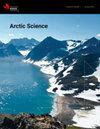由土著居民主导的北极保护支持全球保护实践
IF 3.2
3区 地球科学
Q2 ECOLOGY
引用次数: 2
摘要
随着人们越来越认识到全球保护倡议在保护生物多样性和减轻气候变化影响方面的作用,对北极周围以土著为主导和以土著为中心的保护的兴趣也在上升。通过文献和实践,北极的土著社区正在塑造围绕保护方法、机制和策略的全球话语,并挑战如何使用、管理和保护土地、水域和物种的殖民观念。本土方法、机制和策略往往不同于全球保护工具箱中的方法、机制和策略,而更侧重于地方优先事项、本土知识、传统做法、主权和自决。如何发展和克服挑战和相关负担的方向最好由土著社区、学者、组织和政府提供。重视土著知识并支持社区一级的倡议、战略和实践,通过关注和关注资金、土著领导的研究和管理以及相互指导,可以理解、转发和实施社区的优先事项、需求和价值观。除了有利于保护本身,在土著家园内进行的生物多样性研究有机会成为区域、国家和国际倡议如何最好地与北极及其他地区的土著知识、保护实践和政策制定相结合的典范。本文章由计算机程序翻译,如有差异,请以英文原文为准。
Indigenous-led conservation in the Arctic supports global conservation practices
Amid growing recognition for the role of global conservation initiatives in protecting biodiversity and mitigating climate change impacts, the interest in Indigenous-led and Indigenous-centered conservation in the circumpolar Arctic is also on the rise. Through literature and practice, Indigenous communities in the Arctic are shaping the global discourse around conservation approaches, mechanisms, and strategies and challenging colonial conceptions of how lands, waters, and species should be used, managed, and protected. Indigenous approaches, mechanisms, and strategies often differ from those found in the global conservation toolbox and rather focus on local priorities, Indigenous knowledge, traditional practices, sovereignty, and self-determination. Direction on how conservation should evolve and overcome challenges and related burdens is best given by Indigenous communities, scholars, organizations, and governments. Valuing Indigenous knowledge and supporting community-level initiatives, strategies, and practices comes with the benefits of understanding, forwarding, and implementing community priorities, needs, and values through attention and focus on funding, Indigenous-led research and management, and mutual mentorship. In addition to benefiting conservation itself, biodiversity research conducted within Indigenous homelands has the opportunity to serve as a model for how regional, national, and international initiatives best engage with Indigenous knowledge, conservation practice, and policy development in the Arctic and beyond.
求助全文
通过发布文献求助,成功后即可免费获取论文全文。
去求助
来源期刊

Arctic Science
Agricultural and Biological Sciences-General Agricultural and Biological Sciences
CiteScore
5.00
自引率
12.10%
发文量
81
期刊介绍:
Arctic Science is an interdisciplinary journal that publishes original peer-reviewed research from all areas of natural science and applied science & engineering related to northern Polar Regions. The focus on basic and applied science includes the traditional knowledge and observations of the indigenous peoples of the region as well as cutting-edge developments in biological, chemical, physical and engineering science in all northern environments. Reports on interdisciplinary research are encouraged. Special issues and sections dealing with important issues in northern polar science are also considered.
 求助内容:
求助内容: 应助结果提醒方式:
应助结果提醒方式:


